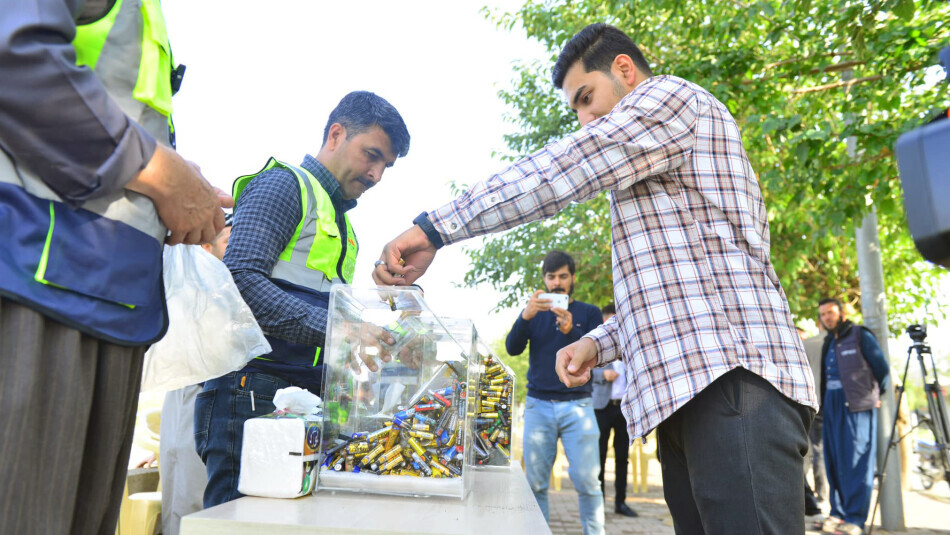
Pari Osman, an environmentalist, collects used batteries daily, which could lead to environmental and health disasters, especially for pregnant women and babies if not handled scientifically.
"We don't discard batteries from clocks, remote controls, and mobile phones after use. I collect them and don't hand them over to anyone else because I don't trust that they will be disposed of properly," said Pari.
The number of people collecting batteries is increasing, and the campaign is expanding in Sulaimaniyah province, more focused on environmentalism than profit.
Batteries contain dangerous heavy substances that have a negative and disastrous impact on the environment and human health when not treated properly. They cause air pollution when burned and contaminate soil and groundwater if buried, according to warnings from the Kurdistan Regional Environmental Protection and Restoration Board.
Individual Efforts in Public Grief:
Pari Osman, living in Sulaimaniyah, has been protecting the environment for 11 years, especially by collecting broken batteries.
"I have collected ten kilograms of batteries so far," he said. Initially, he encouraged his relatives and colleagues to do the same. After collecting batteries, they hand them over to Pari.
"Anyone who collects batteries and doesn't know how to dispose of them can give them to me, and I'll send them to Tanjaro Recycling," Pari added.
There are two types of batteries: disposable, non-rechargeable, and short-lived, rechargeable ones for devices like radios, watches, computers, mobile phones, controllers, calculators, toys, and many other electronic devices.
"I have collected 60 kilograms of batteries so far. They are harmful to health, and the chemicals leak into the soil, polluting the environment," said Mohammed Osman, who has been collecting batteries alone for 12 years.
He collects battery wherever he finds it and asks people to pass it to him once they are out of charge.
According to the Environmental Board; Soil pollution from electronic waste such as batteries, computers and mobile phones is very dangerous because the materials they are made of are very harmful. It takes 300 years for the pile to completely decompose in the soil.
Fighting an Environmental Disaster:
"Although I don't have much, I will at least protect the environment," said Mohammed Hawkar, a businessman and father of seven children.
"In Tanjaro, I incinerate small batteries in a furnace to prevent them from being improperly disposed of in the environment since there is no battery recycling.”
It's unclear how many batteries he collects daily.
Batteries contain heavy substances like lead, mercury, cadmium, manganese, nickel, lithium, and silver, all of which are hazardous to public health and the environment. The Environmental Board states that recycling is the best solution.

Salih Najib, a professor of environmental sciences, says that electronic devices, including batteries, contain components dangerous to humans.
“These components are not recycled healthily, not only in the Kurdistan Region but all over the world.”
The substances in batteries and electronic devices "adversely affect pregnant women, children, sensitive individuals, and the elderly."
Some elements and substances enter the air or soil, where they mix with rock products and then enter the human body.
Najib mentions examples like cadmium, which affects nerves and causes irritation by replacing calcium in bones, or mercury, which causes anemia in children.
According to a World Health Organization WHO report, Najib says that in 2019 alone, the world generated over 53 million tons of electronic waste, with only 17 percent collected for recycling.
"People should be warned about the dangers of batteries, which carry many diseases. First, we need environmental education to protect ourselves from these disasters," the environmental scientist said.
Batteries and electronic waste are significant causes of environmental pollution, and 90 percent of people breathe polluted air. Iraq's air is among the "most polluted" in the world, according to IQ Air, a Swiss air quality technology company.
The (WHO) warns that indoor and outdoor air pollution poses a significant threat to human life, causing the premature death of seven million people worldwide each year.
Omed Omar, supervisor of the environmental department of the Penjwen City of Learning Project, stated that one of their activities is a campaign to collect batteries in shops, mosques, and public places.
"Batteries contain 12 toxic substances that can cause many diseases, including cancer. One single battery can pollute a ton of soil for 50 years," Omid said.
The Sulaimaniyah Municipality had a disappointing experience with collecting small batteries. They used to place boxes in some locations, especially in markets, but they were often found empty. Instead, people disposed of tissues, water cans, and other waste in these boxes.
Zardasht Rafiq, spokesman for the Sulaimaniyah municipality, stated that over 1,000 tons of garbage are taken to the recycling center daily.
There is a car battery recycling factory in Sulaimaniyah that has been operating for over seven years, recycling 3,000 to 4,000 tons of used batteries monthly.
According to the applicable laws of the Iraqi Kurdistan Region IKR, environmental and air pollution are punishable by imprisonment and fines up to 200 million Iraqi dinars IQD (USD140,000), depending on the type and method of violation.
Pari Osman expressed concern that there is no scientific method to protect the environment from the harm of batteries and no necessary guidance for people. Her only option is to send the hundreds of batteries she collects to Tanjaro to generate alternative energy, which in itself poses a threat to the environment.